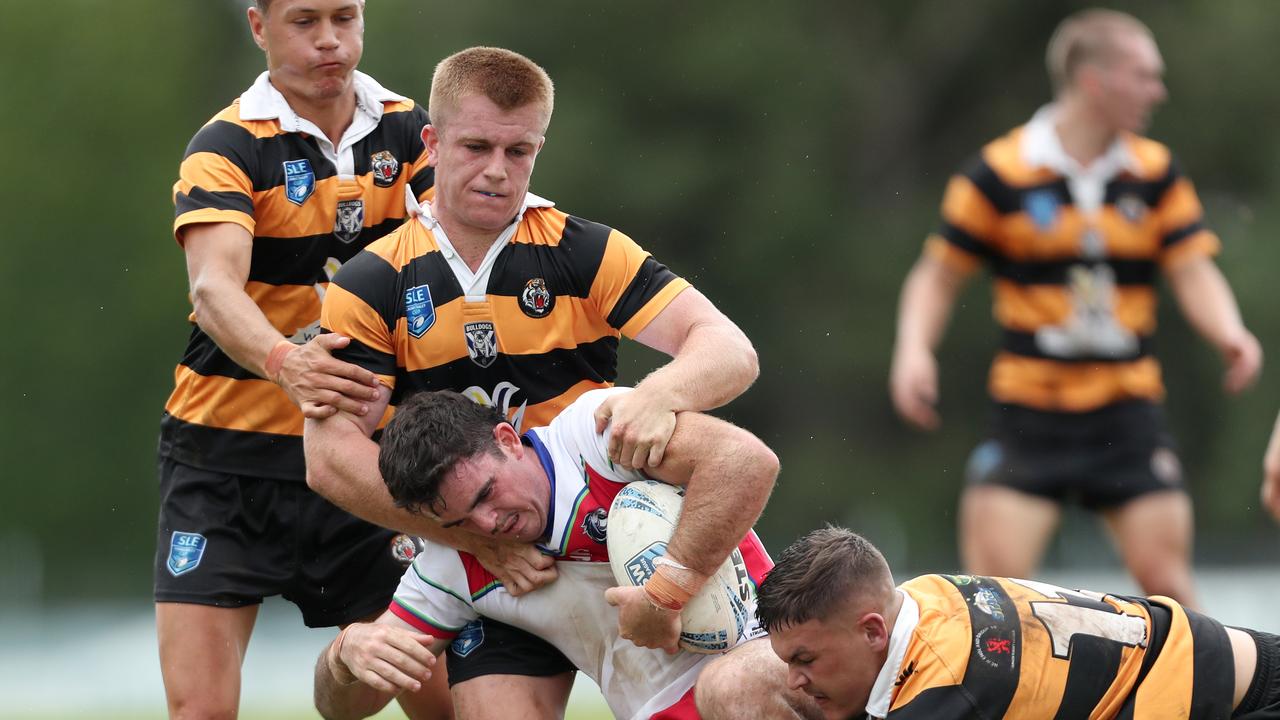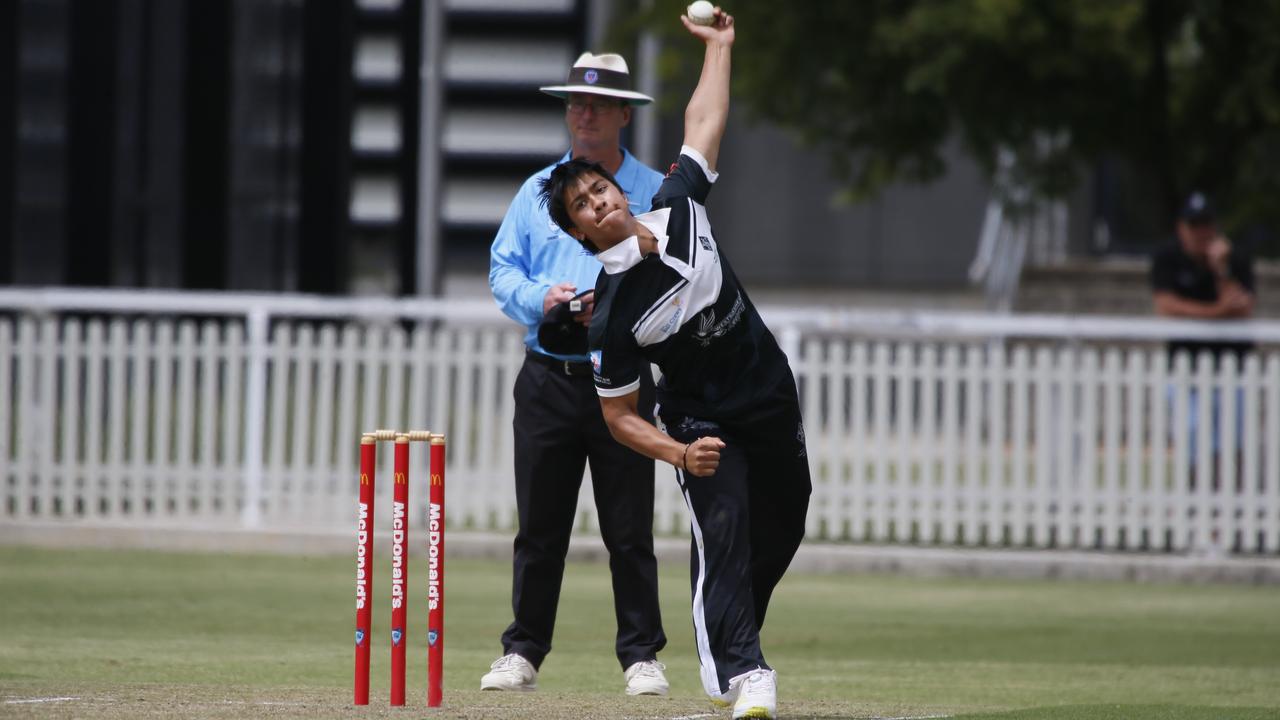ProTen Western Riverina Community Cup: The bush footy comp playing by its own rules
It’s a league with radical rules where every match day feels like a festival. See how a meeting at the pub inspired these tiny towns to revive rugby league in the bush.
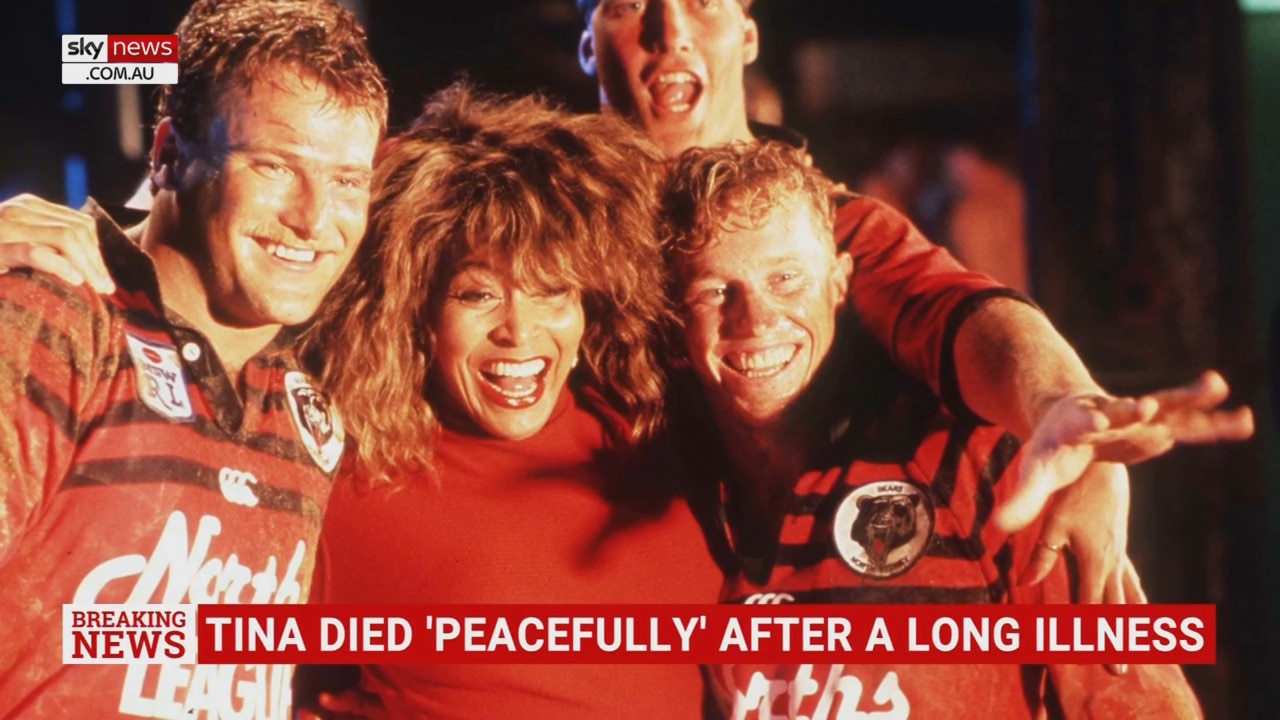
Local Sport
Don't miss out on the headlines from Local Sport. Followed categories will be added to My News.
Every weekend, rugby league competitions of all shapes and sizes take place all over NSW, with players from mini league all the way to the NRL stepping onto the field to do their teams proud.
However this weekend, some 500km southwest of Sydney in the small township of Barellan, perhaps the most unique rugby league competition of them all will kick off for the year, with the launch of the 2023 ProTen Western Riverina Community Cup.
Up to one thousand people are expected to roll into the town of 275 people for one of the best rugby league match days on the calendar.
Representing a collection of six small agricultural towns in the old Group 17 district in the western Riverina, including Barellan, Hillston, Goolgowi, Ivanhoe, Narrandera and Rankins Springs, the competition – named after its sponsor, chicken farming giant ProTen – is unlike any other in the country.
For starters, the rules are different.
The competition adheres to the Safeplay code, which allows no more than two people in the tackle, an initiative designed to reduce injuries in a competition where people in their teens all the way through to their sixties play on the same team.
“When there are only two in the tackle it makes it a lot fairer game and you don’t have that third man in taking out your knees and stuff like that,” said Brent Parsons, the president of the Rankins Springs Dragons.
“I was watching the footy the other night and I heard Gus Gould say they should go to no more than two in the tackle and I thought: ‘That’s what we play.’”
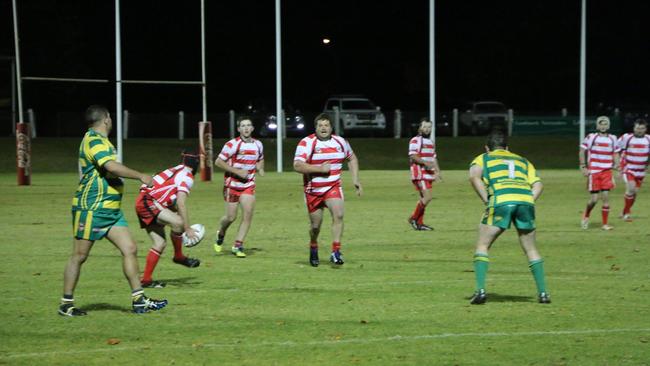
Meanwhile, in a nod to the 1970s and 1980s, the competition also uses the five-metre rule as another injury prevention measure to limit the impact of collisions.
There is also another aspect of the ProTen Cup that is absolutely non-negotiable.
“There’s no paying of players and there’s no paying of coaches, so you either play for the love of the game and who you’re playing for – or you don’t play at all,” says Parsons, who believes that money is one of the biggest threats to clubs and the game in general in regional areas.
“You get some guys in Griffith on upwards of $1000 per game – stupid money for bush football.”
But that’s not all. Perhaps what really gives the Proten Community Cup its edge is its structure.
The six-team competition has just six rounds and then the finals, meaning that every team plays each other once, plus another team twice.
And in a kind of travelling rugby league roadshow, all games in any given round are played at one venue, with each town getting at least one home game a season.
It is a structure that led the rugby league website Battlers for Bush Footy to describe the competition as one where “every round is Magic Round”.
“It’s just a big gala day, really,” says Parsons.
“Last year at our home game we had 1100 people come through the gate, and we’re just a town of 120 people.”
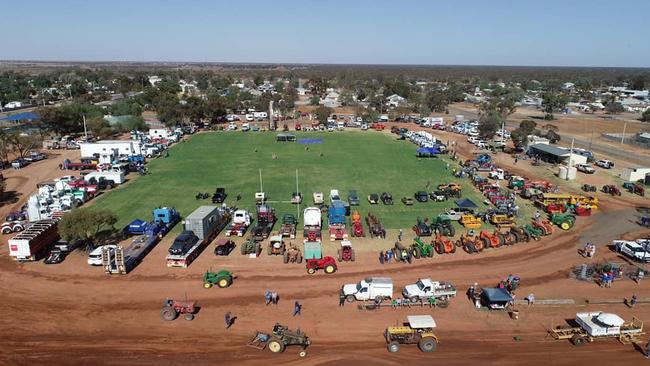
Match day itself resembles something like a big country festival, with people from all over the region converging on one football ground for a day’s worth of rugby league entertainment.
“Each team is very heavily supported,” says Parsons. “You’ve got guys from Ivanhoe who are travelling 300-400km just to play footy and their supporters come with them as well. There are wives, girlfriends and family who travel every weekend to watch their husbands, boyfriends or whatever play football.”
But like all good parties, the festivities don’t finish as soon as the football’s over.
“Everyone will go back to the local RSL club or pub and we’ll mingle there,” says Mark Huntly, the president of the Ivanhoe Roosters.
“And that’s the best thing about this ProTen comp: small communities and the mateship between the teams is something that I don’t think you see in sport and a lot of rugby league clubs these days. That’s why it works so well, having all the teams play at the one venue on the same day.”
Nod to the past, eye on the future
With the five-metre rule, the strict emphasis on amateurism and a festival-like atmosphere for games, in some ways the comp can be seen as a throwback to the glory days of decades past.
However in other ways it’s also perhaps a sign of the future, with the competition providing a blueprint of how to keep bush footy alive in what is an increasingly difficult climate for regional grassroots sport in 2023.
Indeed, the ProTen Cup isn’t just any old footy comp; it is credited with reviving and then keeping alive rugby league in the western Riverina.
To understand its significance, you have to go back a couple of decades, to when the current ProTen clubs played in what was the Group 17 competition.
While the competition had gradually declined over the decades due to dwindling populations in the small towns, a drought in the 2000s put it on life support as clubs struggled to field teams.
“There had been nine years of drought, and that really hurt all the struggling towns,” says Parsons. “Group 17 had first grade and reserve grade up until 2002 and then it just went to a first grade competition. Then some teams were even flat-out filling a first grade side.”
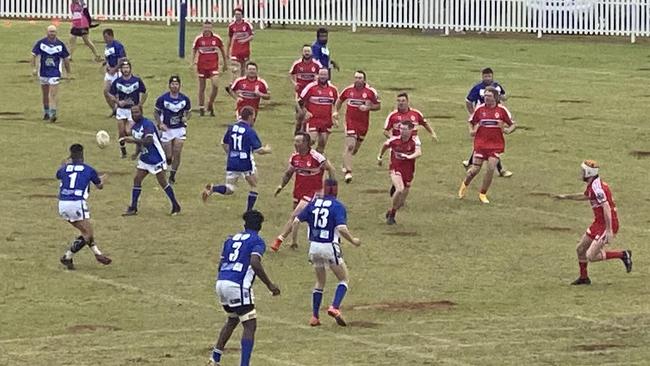
The Group’s strongest club, the Hay Magpies, felt they had outgrown the competition, and after the 2006 season they left to join nearby Group 20, based in Griffith.
This left just four clubs. And as Parsons puts it, a combination of a dwindling player pool and a less than helpful Country Rugby League saw the comp disband after the 2006 season.
“The CRL back in the day more or less said: ‘Either you find another team or two, or you don’t play at all,’ because apparently as a Group you can’t have any less than five teams to be classified as a Group.”
So, for more than a decade there was no rugby league played in the western Riverina. That was until a couple of old rivals – Geoff Hale from Goolgowi and Parsons’ cousin, Jamie Parsons from Rankins Springs – met for a beer in what is now considered an iconic bush footy turning point.
“Geoff’s from Goolgowi and we’re Rankins Springs, and we’re the biggest rivals around here. We don’t like them and they don’t like us. It’s a bit like Roosters and Souths,” says Parsons.
“But they got together one day and said, ‘We should get a few games between our two towns going.’ That went from a meeting at the pub and evolved into the ProTen Community Cup that it is now.
“It all started from a chat, and now we have six teams playing rugby league that weren’t playing for those 13 years.”
And while the CRL might not have been overly helpful when the competition disbanded back in 2006, Parsons has only praise for the role that Bidgee regional area manager Dave Skinner played in getting the comp off the ground.
“They couldn’t have been any more helpful. It was actually Dave’s idea to play all games at the one venue each Saturday.”
So while the clubs had organised and decided to return, they quickly realised there were some challenges associated with actually getting the teams on the pitch.
“In 2006 when it shut, our club had like 20 grand in the bank at the time,” said Parsons.
“But over the years they donated to P&C and guys that were sick, so when we started up football again we had $160 in the bank account.
“So from that we had to buy new footballs, buy jerseys, buy strapping tape – just little things like that, you don’t realise that it adds up to a fair bit of money, and we couldn’t do much with $160!”
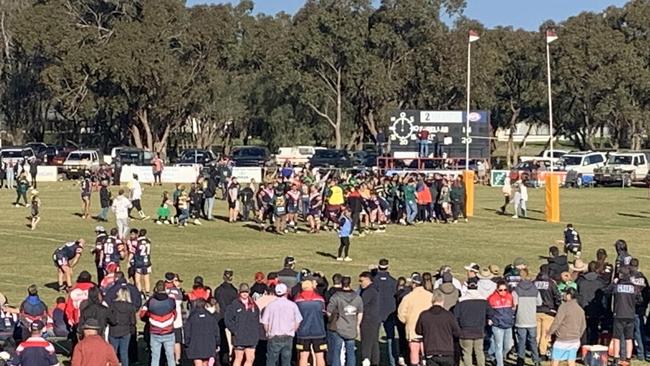
Thankfully for the clubs, ProTen stepped in to sponsor the competition, with the company purchasing the playing kits for all teams.
Although there might not have been any organised rugby league during those in-between years, Parsons – who describes himself as a “rugby league fanatic” – says there certainly wasn’t any shortage of interest once the competition got back up and running in 2018.
“Out of our six teams, there’s probably a good 4000-5000 within all our towns and communities put together.
“Our very first game was in Barellan in 2018 and I think they had 2500-3000 people through the gate. We’d never seen anything like it. The serve line was like 10-deep. You don’t see that in a Griffith grand final. It was amazing to see so many people turn up.”
And it wasn’t just the fans who were interested, with a lot of players inspired by the concept and the opportunity to represent their home towns.
“When I got that phone call in 2018 about starting the Ivanhoe Roosters again it was a proud moment, just to be able to pull the boots on and wear the Roosters’ jumper,” says Mark Huntly, who is now the president of the club.
“As a kid growing up that’s all you ever wanted to do: to play footy for the local community and team, and that’s where with that generation a few of us missed out on it when Group 17 folded.”
Indeed, it’s not just those who live locally who are up for it, with Parsons noting that some of those to have moved away from Rankins Springs are among the keenest to come back and represent the Dragons.
“There are a lot of guys who now live in Griffith who play,” says Parsons. “I’ve got a cousin who lives in Port Macquarie, and he’s come back just to play one game for us. Just because they want to come and play a game for the home team.”
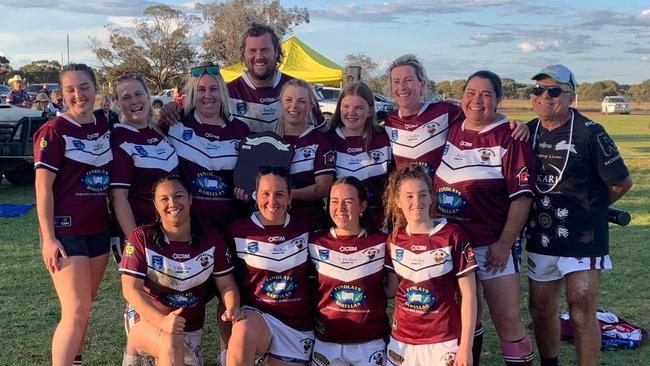
This interest has seen the competition grow since kicking off in 2018, with organisers adding an annual knockout cup, a rugby league 9s day for reserve grade teams, as well as a women’s tackle competition to the schedule.
“Our biggest achievement in the ProTen Cup in the last two years is having the women’s tackle comp start up,” says Parsons.
“It’s just about getting more footy on the park and keeping people interested. It’s a bit of fun, really.”
There was even a sprinkling of star dust at the recent ProTen Community Knockout, held a fortnight ago at Sahara Oval in Ivanhoe, with former NRL forward Joel Thompson returning to play for his junior club, the Ivanhoe Roosters, who went on to take out the tournament.
“I grew up playing footy there, and I was 16 or 17 when I pulled on a Roosters jersey for the last time, but to get back there and pull on an Ivanhoe jersey at Ivanhoe is pretty special,” Thompson told NSWRL.
“You should have seen the crowd; everyone was pumping and enjoying themselves, and after the games, I’ve never seen the club so busy.
“It was such a good feeling to be back and involved, and out of all the footy I’ve played, it is definitely one of the most special weekends I’ve had.”
Created by locals, for locals
The popularity of the ProTen Cup – with its altered rules and gala day concept – is largely down to the simple fact that it was designed by locals to meet the very specific lifestyle of the local communities that take part in it.
This is perhaps best exemplified by the short nature of the competition. While some might consider a six-round season with a three-week finals series to be too short, for many in the western Riverina, that is precisely the appeal.
By kicking off in May and finishing up in late July ahead of the harvest season, the competition aligns with the local farming communities.
“When we first started, we knew we had to have a short competition. Everyone’s lives are too busy these days to commit 22 weeks to rugby league, and in my opinion that’s where sport out in the country here is dying,” says Parsons.
And while the competition is a huge win for rugby league, it’s also clear that the community at large has also benefited from sport returning to these small towns, which range in size from Rankins Springs with around 120 to Narrandera, which has about 4000.
“After every game, 90 per cent of the players will hang around. Everyone goes back to the pub of whatever town you’re at and you do big man-of-the-match awards and boat races,” says Parsons.
“It’s more of a boost to the town and the pub. Rankins Springs is only 120 people and before football we literally had nothing.
“You’d go to the pub on a Friday night, have a few beers and go home or go to someone else’s house. But now we have footy on every Saturday, people coming past and football training every Thursday – it really just brought life back into the town.”
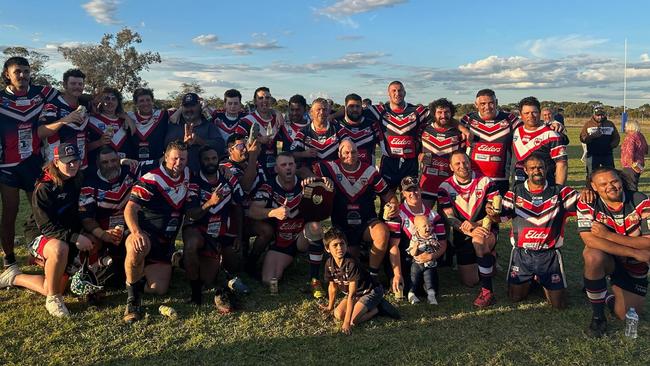
It’s a sentiment that Ivanhoe’s Mark Huntly wholeheartedly agrees with.
“It’s a bit of a buzz again for the town. It’s not something that happened in these towns for 13 or 14 years,” he said.
“You get that buzz during the week, then when you get over that soreness from the weekend and you’re getting close to the next weekend it’s a good feeling again in the town.
“Everyone’s revived, and every training you bring people back into the town that way, businesses are revived,” added Huntly, who himself lives on a farm about 60km out of Ivanhoe.
“You go to the pub now and you can have a conversation about the footy, how we’ve been doing and how it’s all going – there’s definitely a good feel.”
The need for a social and economic boost has been more acutely felt in Ivanhoe in recent times, with the town still struggling with the effects of floods that hit the region late last year.
“Ivanhoe itself in the past six months has done it pretty tough, due to flooding and roads and stuff like that, that’s why we’re looking forward to actually getting a few people come into the town,” said Huntly. “The local café closed due to roads not being opened yet from Hay to Ivanhoe.”
Tying the community together
While the return of organised rugby league through the ProTen Cup has helped breathe some life back into its towns, some of the players say the social aspect and improved community ties associated with the competition has created memories that they will never forget.
“For the very first grand final in 2018, we went through undefeated and then we played Goolgowi, our arch rivals, and that whole week we had old guys coming out to training and cheering us on, it was amazing really for a bit of bush footy,” says Parsons.
It has also brought people of different generations together in ways that many might not have thought possible.
“We’ve got a 55-year-old guy that’s been part of the Rankins Springs club since he was seven or eight years old, and he’s still playing footy for us today,” says Parsons.
“We’ve got a 17-year-old who watched his father play. He said all he wanted to ever do was play footy for Rankin Springs and he managed to do that. So we’ve got kids from 17 all the way up to 55-year-olds playing these days in the same team.”
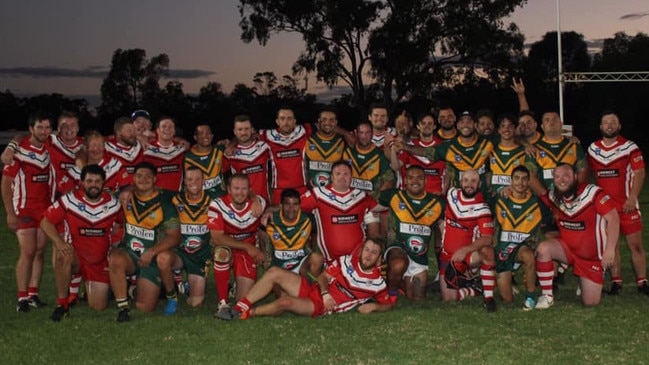
It is a similar story for the Ivanhoe Roosters, with father-son duo Kodie and William Charles to both line up for the tricolours this season.
Huntly also has his own family connection, with the 39-year-old given the opportunity to play alongside his 18-year-old nephew Clay Jones.
“My nephew was born in 2005, which is the last time Ivanhoe held a knockout here, and this is his second year playing footy for the Roosters,” he said.
“That was one good thing for me, to actually be able to play a game of footy with my younger nephew. It’s good to be able to play sport with the younger generation, and we need the younger ones to keep coming through the ranks to keep it all going.”
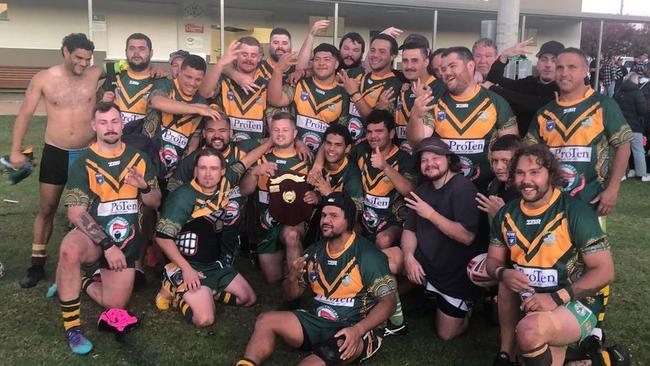
Indeed, while the absence of rugby league for more than a decade has seen Aussie rules grow in the region, there is hope that the return of the game will inspire the next generation to keep league alive.
“After our games on the Saturday arvo you’ll see 20-30 kids out there kicking a ball, running around, playing football amongst themselves. It’s a good sight to see, them all out there kicking the football around,” says Parsons.
“That’s what we always did as kids every Sunday after football, you’d be out there and play until it was dark, and that was the highlight of your week as a kid.”
As for the season, all will be out to knock off last year’s premiers the Narrandera Lizards, who did the double by taking out both the men’s and women’s competitions.
After taking out the knockout cup two weeks ago, the Ivanhoe Roosters are looming as one of the main challengers, however in true rugby league style, Huntly is trying to keep a lid on the hype.
“I think we’ve got a reasonable side, but we’ll just see how we go. I’m not going to talk out of school too much but we’ll give it a bit of a shove, I suppose, and see how we go.”



